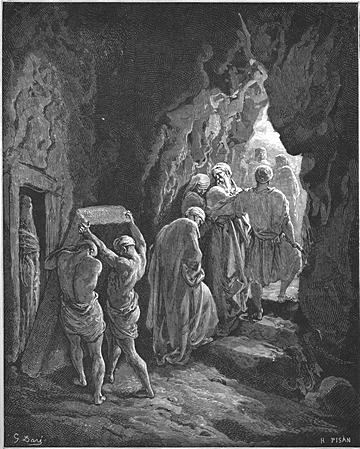1 Peter 3
1 In like manner, wives, be in subjection to your own husbands; so that, even if any do not obey the word, they may be won by the behavior of their wives without a word;
Similiter et mulieres subditæ sint viris suis: ut et si qui non credunt verbo, per mulierem conversationem sine verbo lucrifiant,
2 seeing your pure behavior in fear.
considerantes in timore castam conversationem vestram.
3 Let your beauty be not just the outward adorning of braiding the hair, and of wearing jewels of gold, or of putting on fine clothing;
Quarum non sit extrinsecus capillatura, aut circumdatio auri, aut indumenti vestimentorum cultus:
4 but in the hidden person of the heart, in the incorruptible adornment of a gentle and quiet spirit, which is in the sight of God very precious.
sed qui absconditus est cordis homo, in incorruptibilitate quieti, et modesti spiritus, qui est in conspectu Dei locuples.
5 For this is how the holy women before, who hoped in God also adorned themselves, being in subjection to their own husbands:
Sic enim aliquando et sanctæ mulieres, sperantes in Deo, ornabant se, subiectæ propriis viris.
6 as Sarah obeyed Abraham, calling him lord, whose children you now are, if you do well, and are not put in fear by any terror.
Sicut Sara obediebat Abrahæ, dominum eum vocans: cuius estis filiæ benefacientes, et non pertimentes ullam perturbationem.
7 You husbands, in like manner, live with your wives according to knowledge, giving honor to the woman, as to the weaker vessel, as being also joint heirs of the grace of life; that your prayers may not be hindered.
Viri similiter cohabitantes secundum scientiam, quasi infirmiori vasculo muliebri impartientes honorem, tamquam et coheredibus gratiæ vitæ: ut non impediantur orationes vestræ.
8 Finally, be all like-minded, compassionate, loving as brothers, tenderhearted, humble,
In fine autem omnes unanimes, compatientes, fraternitatis amatores, misericordes, modesti, humiles:
9 not rendering evil for evil, or reviling for reviling; but instead blessing; because to this were you called, that you may inherit a blessing.
non reddentes malum pro malo, nec maledictum pro maledicto, sed econtrario benedicentes: quia in hoc vocati estis, ut benedictionem hereditate possideatis.
10 For, "He who would love life, and see good days, let him keep his tongue from evil, and his lips from speaking deceit.
Qui enim vult vitam diligere, et dies videre bonos, coerceat linguam suam a malo, et labia eius ne loquantur dolum.
11 Let him turn away from evil, and do good. Let him seek peace, and pursue it.
Declinet a malo, et faciat bonum: inquirat pacem, et sequatur eam:
12 For the eyes of the Lord are on the righteous, and his ears open to their prayer; but the face of the Lord is against those who do evil."
Quia oculi Domini super iustos, et aures eius in preces eorum: Vultus autem Domini super facientes mala.
13 Now who is he who will harm you, if you become zealous of that which is good?
Et quis est qui vobis noceat, si boni æmulatores fueritis?
14 But even if you should suffer for righteousness' sake, you are blessed. "And do not fear what they fear, nor be troubled."
Sed et si quid patimini propter iustitiam, beati. Timorem autem eorum ne timueritis, et non conturbemini.
15 But sanctify in your hearts Messiah as Lord; and always be ready to give an answer to everyone who asks you a reason concerning the hope that is in you, yet with humility and fear:
Dominum autem Christum sanctificate in cordibus vestris, parati semper ad satisfactionem omni poscenti vos rationem de ea, quæ in vobis est, spe.
16 having a good conscience; so that when they speak evil against you, they may be put to shame who slander your good manner of life in Messiah.
sed cum modestia, et timore, conscientiam habentes bonam: ut in eo, quod detrahunt vobis, confundantur, qui calumniantur vestram bonam in Christo conversationem.
17 For it is better, if it is God's will, that you suffer for doing well than for doing evil.
Melius est enim benefacientes (si voluntas Dei velit) pati, quam malefacientes.
18 Because Messiah also suffered for sins once, the righteous for the unrighteous, that he might bring you to God; being put to death in the flesh, but made alive in the spirit;
quia et Christus semel pro peccatis nostris mortuus est, iustus pro iniustis, ut nos offerret Deo, mortificatus quidem carne, vivificatus autem spiritu.
19 in which he also went and made a proclamation to the spirits in prison,
In quo et his, qui in carcere erant, spiritibus veniens prædicavit:
20 who before were disobedient, when God waited patiently in the days of Noah, while the box-shaped ship was being built. In it, few, that is, eight souls, were saved by means of water.
qui increduli fuerant aliquando, quando expectabant Dei patientiam in diebus Noe, cum fabricaretur arca: in qua pauci, id est octo animæ salvæ factæ sunt per aquam.
21 This is a symbol of baptism, which now saves you—not the removal of dirt from the body, but an appeal to God for a good conscience, through the resurrection of Jesus (the) Messiah,
Quod et vos nunc similis formæ salvos fecit baptisma: non carnis depositio sordium, sed conscientiæ bonæ interrogatio in Deum per resurrectionem Iesu Christi,
22 who is at the right hand of God, having gone into heaven, angels and authorities and powers being made subject to him.
qui est in dextera Dei, deglutiens mortem ut vitæ æternæ heredes efficeremur: profectus in cælum subiectis sibi angelis, et potestatibus, et virtutibus.





















